SCERT AP Board 6th Class English Solutions 3rd Lesson Little Hearts Questions and Answers.
AP State Syllabus 6th Class English Solutions 3rd Lesson Little Hearts
6th Class English 3rd Lesson Little Hearts Textbook Questions and Answers
Look at the picture and answer the questions that follow.

Question 1.
Do you make friends easily?
Answer:
Yes, I make friends easily.
Question 2.
What are Mends for?
Answer:
Friends are toshare our feelings, to ehat and play together. Friends are helpful in times of need.
![]()
Question 3.
Have you ever quarrelled with your Mends? If so, for what?
Answer:
Yes, I have quarrelled with my friends many times at play.
Question 4.
Is it hard to forgive Mends?
Answer:
No, it is not hard. It is easy to forgive friends.
Reading Comprehension
I. Answer the following questions in one or two sentences.
Question 1.
How were the girls dressed?
Answer:
The two little girls were dressed in new clothes. The little girl was wearing a green skirt and the older a pink skirt.
Question 2.
Where did the two girls want to play?
Answer:
The two girls wanted to play at a large puddle across the street.
Question 3.
Akulka grew angry at Malasha. What made her angry?
Answer:
At the puddle, Malasha splashed muddy water on Akulka’s new dress and face. This made Akulka angry,
Question 4.
Who tried to stop the quarrel?
Answer:
Akulka’s grandmother tried to stop the quarrel.
![]()
Question 5.
How did the quarrel end?
Answer:
Parents realized their mistake after seeing Akulka and Malasha becoming friends again. They felt ashamed and stopped fighting. Thus the quarrel ended.
II. Complete the following choosing the correct options given after them.
1. “Don’t go Malasha!” Akulka warned her not to
a) get their shoes spoil
b) get their school bags wet
c) get injured
Answer:
a) get their shoes spoil
2. “Let’s remove our shoes and play.” It shows that Akulka was
a) careless
b) afraid of her parents
c) interested in cleanliness
Answer:
b) afraid of her parents
3. “Don’t be afraid !” said Akulka,………….
a) to warn Malasha
b) to threaten Malasha
c) to give confidence to Malasha
Answer:
c) to give confidence to Malasha
4. Akulka’s mother gave a slap on Malasha’s face because
a) she quarreled with her daughter
b) she made her daughter’s dress dirty
c) she committed theft in her house
Answer:
b) she made her daughter’s dress dirty
5. The men also joined the scene. Here‘scene’refers to the
a) quarrel
b) puddle
c) war
Answer:
a) quarrel
III. Read and rearrange the following sentences in the order of their occurrence in the story:
1. Akulka and Malasha threw pieces of paper in water and played together.
2. Akulka’s mother slapped Malasha.
3. They wanted to play in the puddle.
4. Akulka and Malasha made a new rill to let the water flow.
5. The members of the two families started fighting.
6. It was Sunday and the two little girls were in their new dresses.
7. s Grandma tried to stop the quarrel.
8. Malasha splashed the muddy water on Akulka’s dress.
Answer:
- It was Sunday and the two little girls were in their new dress. (6)
- They wanted to play in the puddle. (3)
- Malasha splashed the muddy water on Akulka’s dress. (8)
- Akulka’s mother slapped Malasha. (2)
- The members of the two families started fighting. (5)’
- Grandma tried to stop the’ quarrel. (7)
- Akulka and Malasha made a new rill to let the water flow. (4)
- Akulka and Malasha threw pieces of paper in water and played together. (1)
Vocabulary
I. The following are sentences taken from the lesson ‘Little Hearts’. Read them and encircle the word that does not indicate the given context.
1. Their mothers dressed them in new clothes.
[kind caring cruel]
2. They began to play in the puddle.
[serious playful naughty]
3. One man pushed the other and a fight had begun.
[quarrelsome short tempered peaceful]
4. The old woman tried to stop the quarrel.
[threatening gentle peace-loving]
5. The two girls ran along the rill laughing and jumping in joy.
[friendly selfish good-natured]
6. The men looked at the girls and felt ashamed.
[shameful guilty innocent]
4. The old woman fried to stop the quarrel.
[(threatening^) gentle peace-loving]
5.. The two girls ran along the rill laughing and jumping in joy.
[friendly (selfish) good-natured]
6. The men looked at the girls and felt ashamed.
[shameful guilty (innocent)]
Answer:
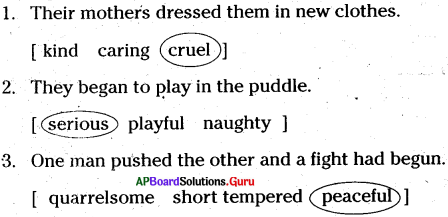
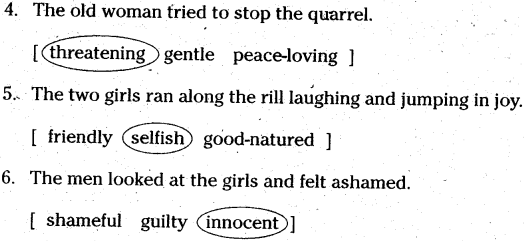
II. Fill in the blanks in the following paragraph with the suitable words given in the box.
![]()
There was a …..(1)…… across the street. A dog was passing by it. He stopped and looked in it where there was a bird flying in the sky. The foolish dog suddenly ……..(2)…….. into the puddle. Poor thing! He became ………(3)…….. His eyes were filled with ……(4)…….. water. What should we do then? A ……(5)………. girl fetched a bucket of water to ……(6)….. the mud stains of the dog. The dog looked at the girl and jumped to his feet ……..(7)…….
Answer:
- puddle
- jumped
- soiled
- muddy
- little
- wipe off
- happily
![]()
III. Read the following paragraph and write antonyms of the underlined words.
Akulka’s mother caught Malasha and gave (a) a slap on her face. Malasha began (b) to howl, and her mother ran out of the house. “Why do you slap my daughter?” she began to scold (c) her neighbour. Soon, it turned to a Mg (d) quarrel. The men also joined (e) the scene. One man pushed (f) the other, and a fight had begun. Akulka’s grandmother tried to separate (g) them. They paid no attention (h).
a) ……………. b) ……………. c) ……………. d) …………….
e) ……………. f) ……………. g) ……………. h) …………….
Answer:
a) took
b) stopped
c) praise
d) small
e) left
f) pulled
g) unite
h) negligence
Grammar
I. In the previous lesson you have learnt writing sentences describing ‘ongoing’ actions using Present Continuous Tense. We can change them into questions to confirm the information.
Examples:
It is raining. – Is it raining?
The girls are playing. – Are the girls playing?
Men are still fighting. – Are men still fighting?
Such sentences are called ‘Interrogative sentences’. Here they are in Present Continuous Tense. A sentence that asks a question is called an Interrogaltive sentence. It ends with a question mark.
Do you know how to write them as interrogatives?
If the subjects are ‘he, she, it and any singular noun’, use ‘is’ before them. And for the subjects ‘we, you, they and any plural noun’, use ‘are’ before them. If the subject is ‘I’, use ‘am’ before it.
Observe the following examples.
She is singing. – Is she singing?
They are coming. – Are they coming?
Change the following statements into questions.
1. The children are playing.
2. Students are waiting for their bus.
3. The teacher is walking slowly.
4. They are drinking water.
5. Usha is cleaning her room.
6. The girl is preparing tea.
Answer:
1. Are the children playing?
2. Are students waiting for their bus?
3. Is the techer walking slowly?
4. Are they drinking water?
5. Is Usha cleaning her room?
6. Is the girl preparing tea?
![]()
II. Degrees of Comparison
The adjectives change in form to show comparison. They are called the three degrees of comparison.
Read the following sentences.
1. Gopal is the tallest of all in the class.
2. Rani is cleverer than Ramya.
3. My house is as big as yours.
In sentence 1„ the adjective ‘tallest’ denotes the superlative degree. In sentence 2, the adjective ‘cleverer’ denotes the comparative degree. In sentence 3, the adjective ‘big’ denotes positive degree.
Read the following sentences and point out the adjectives and name the Degree of Comparison of each.
1. The train runs faster than the bus.
2. Lead is the heaviest metal.
3. Hari is the laziest boy in the class.
4. The two little girls are wiser than the older people.
5. Mount Everest is the highest peak of the Himalayas.
6. Iron is more useful than copper.
7. This is the most interesting story.
8. Ooty is cooler than Chennai.
Answer:
1. The train runs faster than the bus:
Adjective → ‘faster’ → ‘Comparative Degree’
2. Lead is the heaviest metal.
Adjective → ‘heaviest’ → ‘Superlative Degree’
3. Hari is the laziest bov fn the class.
Adjective → ‘laziest’ → ‘Superlative Degree’
4. The two little girls are wiser than.the older people.
Adjective → ‘wiser’ → ‘Comparative Degree’
5. Mount Everest is the highest peak of the Himalayas.
Adjective → ‘highest’ → ‘Superlative Degree’
6. Iron is more useful than copper.
Adjective → ‘more useful’ → ‘Comparative Degree’
7. This is the most interesting story.
Adjective → ‘most interesting’ → ‘Superlative Degree’
8. Ootv is cooler than Chennai.
Adjective → ‘cooler’ → ‘Comparative Degree’
III. Articles
Read the following paragraph :
Sir C.V. Raman was a scholar in sound and sound related physics. His research in optics, the Science of light resulted in the discovery of the Raman Effect. The discovery won him the Nobel Prize for physics. It was the first time the prize was awarded to an Asian! The scholar was the Pride of India.
The underlined phrases begin with either ‘a / an’ or ‘the’. These are called ‘Articles’. There are rules for the use of articles. Let us learn them in detail.
a) We use ‘a’ before singular common nouns that begin with consonant sounds,
![]()
b) We use ‘an’ before singular common nouns that begin with a vowel sound,

c) We use ‘the’
1. before a common noun which is mentioned for the second time.
e.g. I saw a dog. The dog was barking.
2. before superlative adjectives.
e.g. the largest, the best, the smelliest, the most.
3. before ordinal numbers.
e.g. the first, the second ..
4. before the names of musical instruments.
e.g. the guitar, the Violin, etc.
5. before a noun when we mean something in particular.
e.g. the Raman Effect, the TV, the Radio
6. with unique things.
e.g. the sun, the moon, the earth, the sky, the universe.
7. before the names of awards.
e.g. the Nobel Prize, the Bharat Ratna, the Padmabhushan, etc.
Now, fill in the blanks in the following sentences with ‘a /an or the’.
1. Ravi Varma was ………….famous painter.
2. English is …………… international language.
3. ………… sun is ………… star.
4. ………… earth moves round ………. sun.
5. He is ………. expert in Robotics.
6. It is ……….. issue of Human Rights.
7. I listen to ………. radio a lot.
8. I met lawyer yesterday. ………….. lawyer was famous in the city.
9. My brother is learning to play ……… piano.
10. Raghu is ………. best batsman in our team.
Answer:
- a
- an
- The, a
- The, the
- an
- an
- the
- a, The
- the
- the
Writing
I. Look at the picture of ‘Peacock’. With the help of the following hints write a composition about the Peacock.
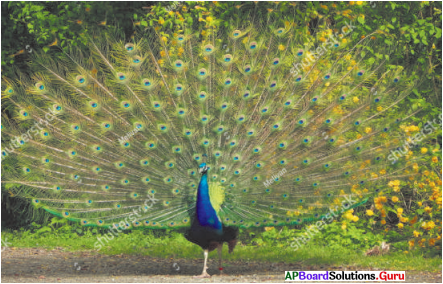
Hints : the peacock – our National bird – beautiful bird – different colours – long tail – about 2.25 mts. long – ‘eye markings’ on the tail – colours change in the sunlight – dances – rains – walks proudly
Answer:
The peacock is our National Bird. It is a beautiful bird with different colors of feathers. It has a long tail. The tail is about 2.25 mts long. We can see ‘eye markings’ on the tail. Their colours change in the sunlight. It dances in rain spreading the feathers of its tail. The peacock walks proudly with its colourful tail.
II. Message Writing
Read the following Telephone Conversation between Teju and Pranay. Teju’s brother Sanju is not at home. So, Teju writes a message for his brother as he has to leave for his tuition.
Pranay : Hello, can I speak to Sanju?
Teju : Sanju is not at home. I am his brother Teju.
Pranay : I am Pranay. Could you tell your brother not to come to Railway station today to pick me up? The train is running late by 8 hours.
Teju : Which train?
Pranay : The Rajadhani Express. It will arrive in Vijayawada by tomorrow at 8 o’clock in the morning. Tell him to come tomorrow morning.
Teju : I will surely pass the information.
Pranay : Thank you.
Read the message written by Teju after his telephone conversation.
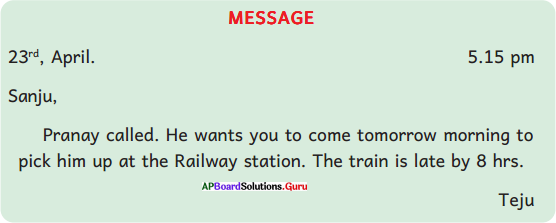
Read the following Telephone conversation between Radha and her mother.
Mother : Hello, Radha, I’ll not come home now. We have an urgent meeting in the office. Do you have your dance class today?
Radha : Yes, mom, I have to leave now. What’s the matter?
Mother : Tell your father to come to NTR circle by 8 pm to pick me up. I’ll wait there.
Radha : O.K. Mom.
Now, Radha leaves message for her father. Write her message in the box provided below.
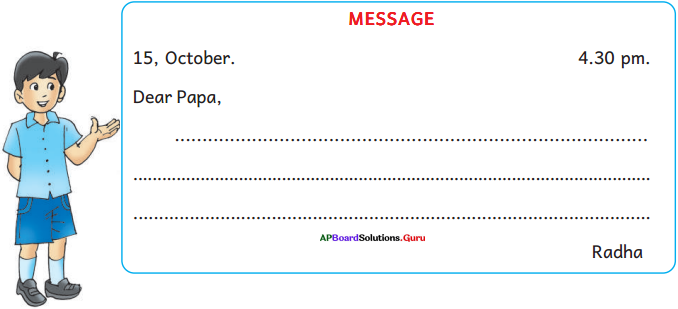
Answer:

Talking Time
I. Say the following pairs of words aloud.

II. Here is an announcement in the School Assembly by the SPL. Read it.
Good morning to all. A good chance for us. Our school will organize an Inter¬School Science Exhibition on February, 22 from 10 am to 4 pm. Working models, informative charts and computer programmes will be exhibited. The best 10 models will be selected for District Level Science Exhibition. All the best. Thank you. Have a nice day.
Now make another announcement of your own, as your school students are going to Nagarjuna Sagar on an educational tour. Instruct them to get their parents’ permission letters for the two-day tour.
Answer:
Good morning to all. We are going to Nagarjuna Sagar on a pleasant educational tour, to get knowledge as well as pleasure. All the arrangements are made by our school management to make the trip successful. For this, we require letters of your parents’ permission for a two-day tour. Letters should be submitted to your class teachers within one week.
Listening
Listen to the following story and answer the questions.
THE WISE JUDGEMENT
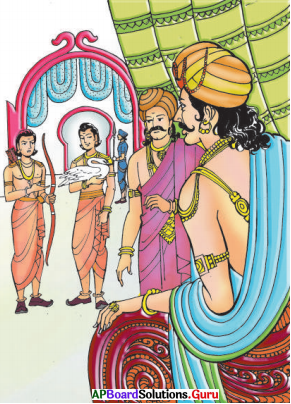
Suddodhana was the king of Kapilavasthu. Siddartha was his son and Devadutta his nephew.
One day Devadutta came to the king’s court in an angry mood, “Your Majesty! I want justice,” he shouted.
“What has happened?” asked the king.
“Siddhartha has taken my swan. He’s not giving it to me,” said Devadutta.
The king was surprised because he knew that Siddartha was good and gentle. He never takes anything from anyone.
Just then Siddartha entered the court with a swan in his arms.
“Is that your swan?” the king asked Devadutta.
“Yes it is. I shot it,” said Devadutta.
“But the swan fell at my feet. I picked it up and took out the arrow from its side and applied medicine on its wound. I saved its life. The swan is mine,” said Siddartha.
The king asked his Chief Minister for advice.
The Minister said, “Devadutta shot the swan. If Devadutta killed the swan, then it would be his. Siddartha saved its life. So, the swan is Siddartha’s.”
1. Who came to the king’s court? Why was he angry?
2. “Siddartha had taken away something!” What had he taken?
(Note : Q.No. 2 & Q.No. 3 are same.)
3. What had Siddartha taken away?
4. What did Siddartha bring in his arms?
5. Why did Devadutta say the swan was his?
6. Where did the swan fall? How did Siddartha save the swan’s life?
7. Which do you think is better —- killing a bird or looking after it?
8. This story shows us that Siddartha was ………….
a) cunning
b) cruel
c) kind
Answer:
- Devadutta came to the king’s court. He was angry because Siddartha took his swan and was not giving it to him.
- He had taken the injured swan shot by Devadutta.
- Siddartha had taken away the injured swan shot by Devadutta.
- Siddartha brought a swan in his arms.
- Devadutta had shot the swan.
- The swan fell at the feet of Siddartha. Siddartha took out the arrow from the bird and applied the medicine on its wound.
- Looking after the bird is better than killing a bird.
- (c) kind
Read it yourself
A Mother’s Wise Advice
The king of Kosala killed the king of Benares and took the queen as a prisoner. But her son escaped luckily and grew in a countryside. He raised a large army and declared war against the Kosala king.
The prince’s mother heard of this threat from her son by some faithful servants. She was a gentle and kind woman who wanted to prevent violence and suffering and killing. So she advised him to close every entrance to the city. The prince decided to follow his mother’s wise advice. His army blockaded the city for seven days and nights. Then the citizens captured their unlawful king, cut off his head, and delivered it to the prince. He entered the city triumphantly and became the new king of Benares.
Comprehension
Answer the following questions.
1. How did the prince escape?
Answer:
The prince escaped by sneaking away through the sewers.
2. Why did the prince’s mother try to stop the battle?
Answer:
The prince’s mother was a gentle and kind woman. She wanted to prevent violence, suffering, and killing in the battle.
![]()
3. How did the prince get his kingdom back?
Answer:
The prince blockaded the city and made people wore down. The citizens captured their unlawful king and cut off his head, and delivered it to the prince. He became the new king of Benares.
Study Skills
A. Study the following pie chart carefully.
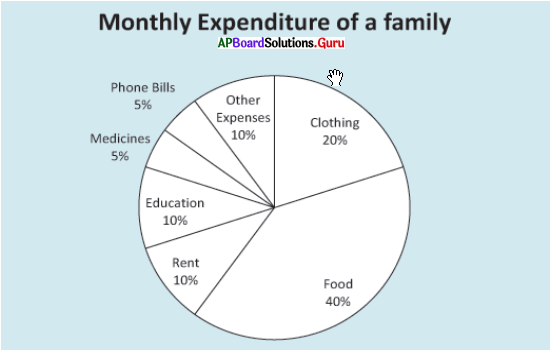
Let’s go through the description of the Pie-chart.
The Pie-chart shows the percentage of a family’s household expenditure distributed into seven categories. These are food, clothes, education, medicines, phone bills, rent and other expenses. According to the chart, the family’s highest expenditure is on food. The lowest expenditure is on medicines and phone bills. If we make a list of the items of expenditure from the highest to the lowest, we find this order: food, clothing, rent, education, other expenses, medicines and phone bills.
Now, answer the following questions.
1. How many items are mentioned in the chart?
2. On which item does the family spend more mohey?
Choose the correct answer from the choices given below and put a tick (✓) mark.
3. Which of the following took the same percentage of expenditure?
a) rent and phone bills
b) rent and education
c) rent and medicine
4. Choose the correct statement.
a) The items with least expenditure are two in the chart.
b) The items with least expenditure are three in the chart.
c) The item with least expenditure is only one in the chart.
5. Choose the correct statement from the following.
a) The sum of expenditure on rent and education is equal to the expenditure of clothing.
b) Expenditure on food item is equal to the sum of clothing and rent.
c) The sum of expenditure on phone bills and medicines is double the expenditure of clothing.
Answer:
- Seven items are mentioned in the chart.
- The family spends more money on food items.
- b) rent and education
- a) The items with least expenditure are two in the chart.
- a) The sum of expenditure on rent and education is equal to the expenditure of clothing.
B. Here is the dictionary entry of the word ‘soil’. Read it carefully.
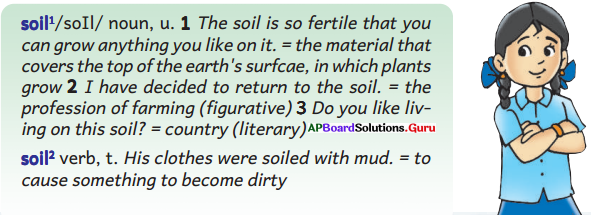
Fill the following table based on the information given above. The first one is done for you.
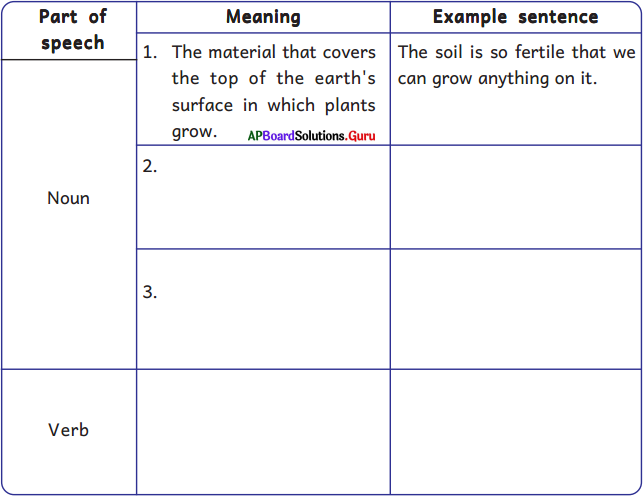
Answer:
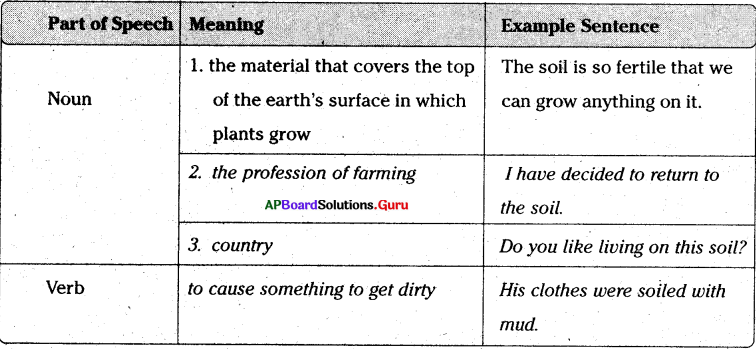
Fun Time
I. Can you answer the following questions? Try.
1. What can travel the world while staying in a corner?
2. What is made of water but if you put it into water it will die?
3. I’m tall, when I’m young and I’m short, when I’m old. What am I?
4. What has hands but cannot clap?
5. What has a head and tail but no body?
6. What has an eye but cannot see?
7. What kind of room has no doors or windows? .
8. What kind of tree can you carry in your hand?
9. Which word in the dictionary is incorrect?
10. Feed me and I live, yet give me a drink and I die. Who am I?
Answer:
- Postal stamp
- Ice cube
- Candle
- Clock
- Coin
- Needle
- Mushroom
- Palm
- Incorrect
- fire
II. Match the expressions with their contextual settings.
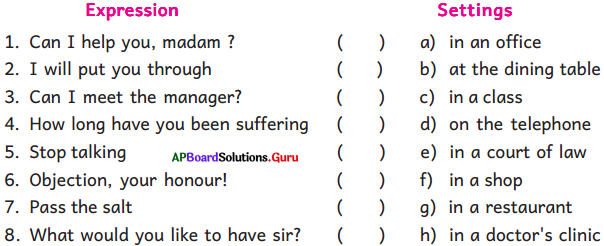
Answer:
| Expression | Settings |
| 1. Can I help you, madam? | f) in a shop |
| 2. I will put you through | d) on the telephone |
| 3. Can I meet the manager? | a) in an office |
| 4. How long have you been suffering | h) in a doctor’s clinic |
| 5. Stop talking | c) in a class |
| 6. Objection, your honour! | e) in a court of law |
| 7. Pass the salt | b) at the dining table |
| 8. What would you like to have sir? | g) in a restaurant |
Little Hearts Summary
Malasha and Akulka were little girls studying sixth class. One day they were dressed in new clothes. It was a rainy day. They gathered at a large puddle across the street. They were playing at the puddle.. Malasha plumped her foot into the water. And the muddy water splashed and fell non-Akulka’s new dress. On seeing this Akulka became angry and ran after Malasha. Malasha started running towards her home. On their way, Akulka’s mother saw that and slapped Malasha’s face. There started a quarrel between the two families. The two families were busy with their quarrel. But the two girls forgot their quarrel and went to the puddle to play there. They were busy laughing, running, and jumping along the rill. An old woman showed the quarreling people how the two girls were playing happily forgetting their quarrel. On seeing the girls playing together, they felt ashamed and left the place.